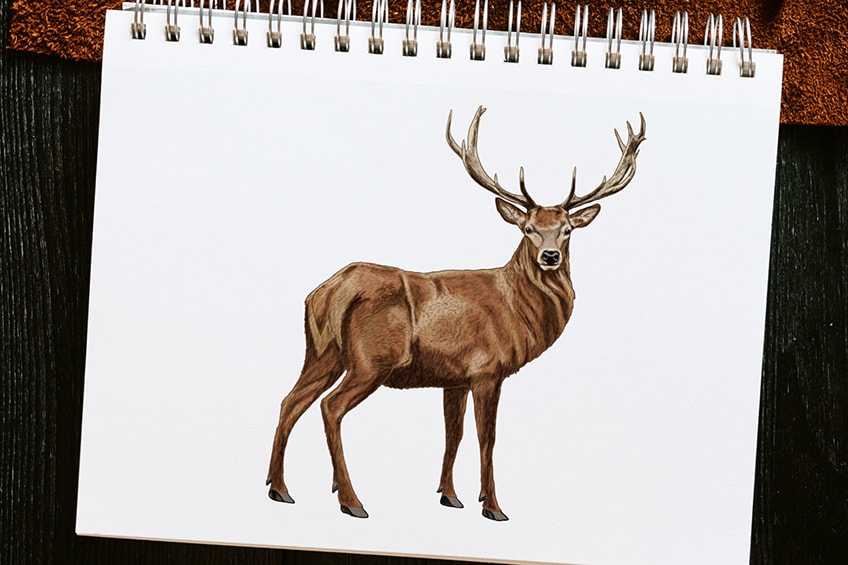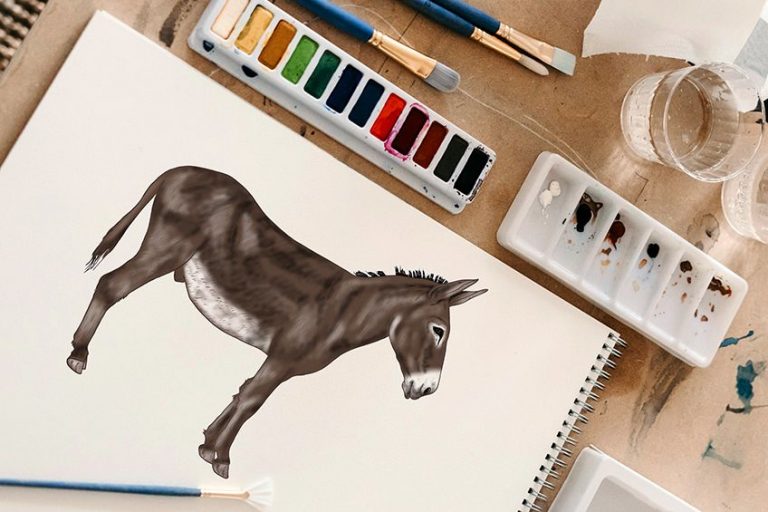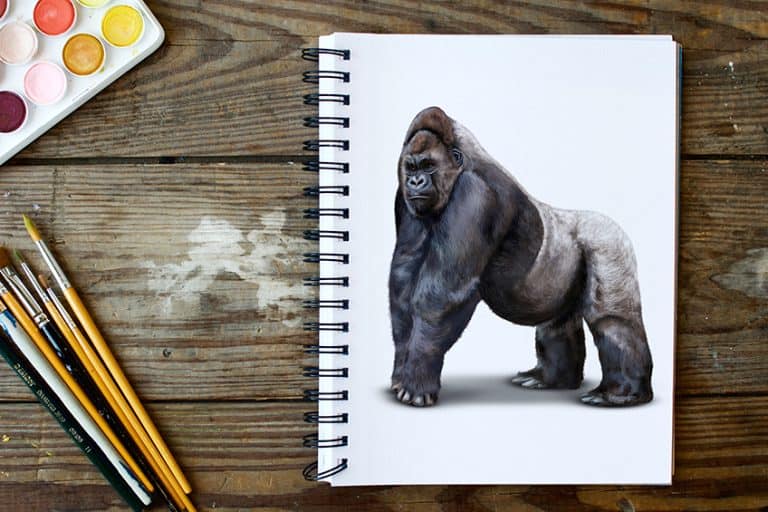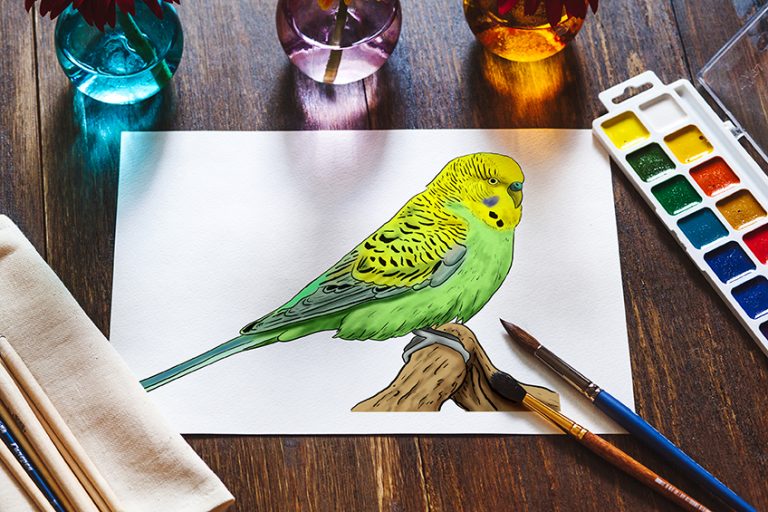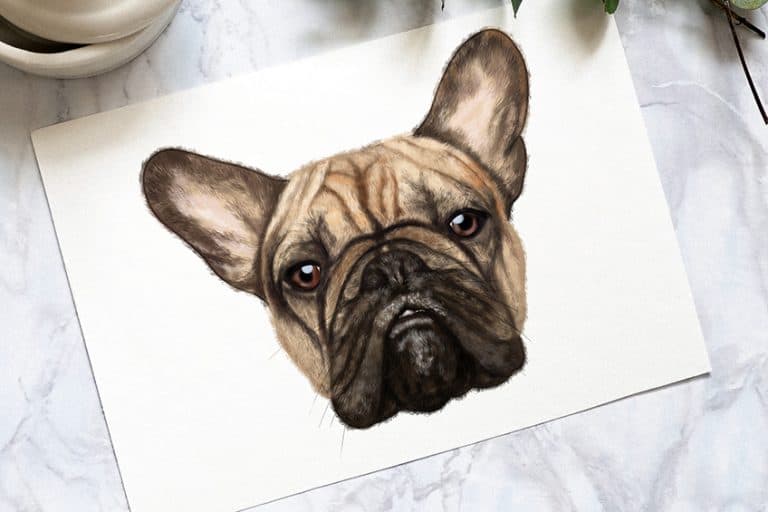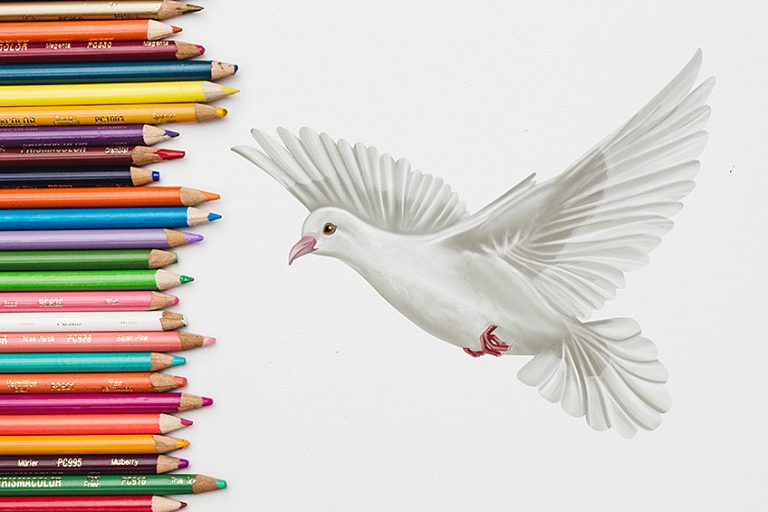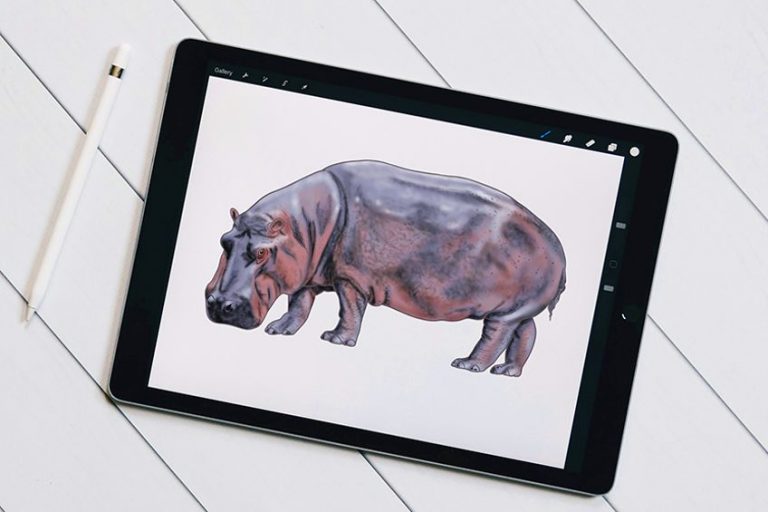How to Draw a Deer – Creating a Realistic Deer Drawing
Today’s “how to draw a deer” drawing tutorial is a fun and exciting one! Not only will you be learning some interesting facts about deers, but you will also learn how to create a realistic deer drawing. Did you know that deers are part of the only group of animals in the world to have antlers? These antlers are one of the fasted growing tissues, growing at an exceeding rate of up to half an inch every day. So, let’s roll up our sleeves and get drawing!
Table of Contents
- 1 A Drawing Tutorial on Creating a Deer Sketch
- 1.1 Step 1: Draw the Body of Your Deer Sketch
- 1.2 Step 2: Draw the Rear Body
- 1.3 Step 3: Draw the Head of Your Deer Illustration
- 1.4 Step 4: Draw the Head Features
- 1.5 Step 5: Add the Neck to Your Deer Drawing Head
- 1.6 Step 6: Draw the Antlers
- 1.7 Step 7: Draw the Legs of Your Deer Illustration
- 1.8 Step 8: Outline Your Deer Drawing
- 1.9 Step 9: Add Texture to Your Deer Art
- 1.10 Step 10: Begin the Coloring Process
- 1.11 Step 11: Add a Secondary Color Coat and Begin Shading
- 1.12 Step 12: Contour Your Realistic Deer Drawing
- 1.13 Step 13: Shade Your Deer Drawing Head and Face
- 1.14 Step 14: Shade the Body of Your Deer Illustration
- 1.15 Step 15: Add Highlights to the Deer
- 1.16 Step 16: Finalize Your How to Draw a Deer Sketch
- 1.17 Step 17: Add a Shadow to Your Deer Drawing
- 2 Frequently Asked Questions
A Drawing Tutorial on Creating a Deer Sketch
Remember the adorable “Bambi”? Our drawing tutorial will also form part of a tribute to this incredible movie! Follow along today and learn how the construction process works, as well as the shading, contouring, and coloring process too! After our easy step-by-step guide, you will be able to create a realistic, but also adorable, deer drawing!
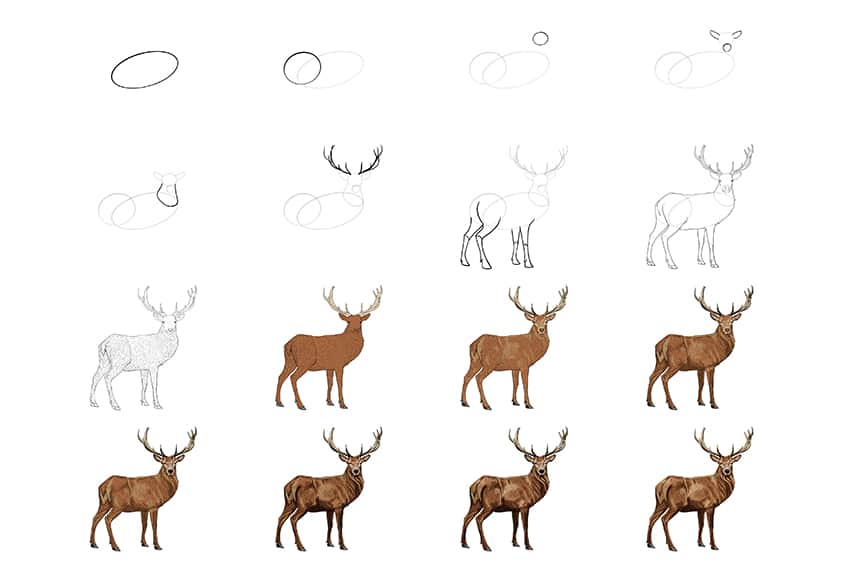
For a better insight into the drawing steps, please take a look at our deer illustration collage above.
Step 1: Draw the Body of Your Deer Sketch
Begin by drawing a slightly tilted oval shape that will represent the body of your deer drawing.
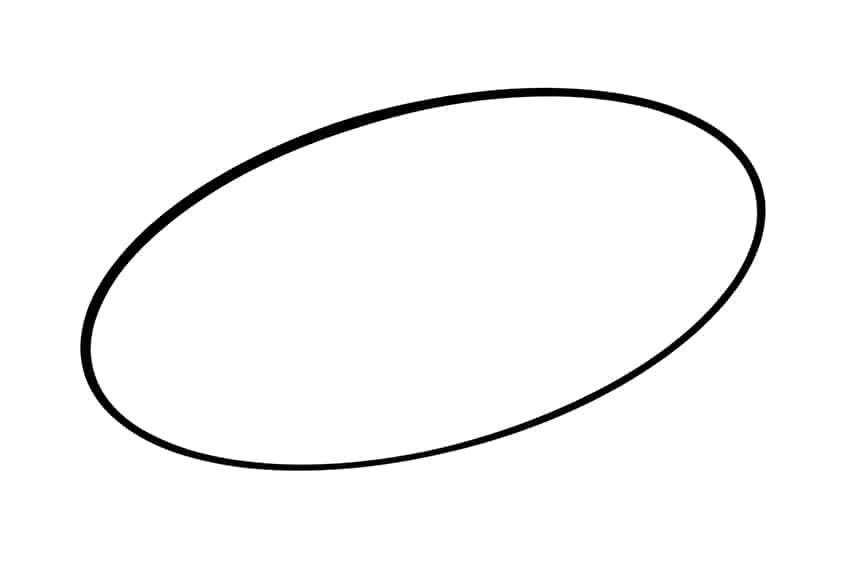
Step 2: Draw the Rear Body
Deers have quite a large rear thigh. To represent this, draw an oval shape on the left side of the main body. This should slightly overlap the body as well.
Note! The rear thigh should be half the size of the main body.
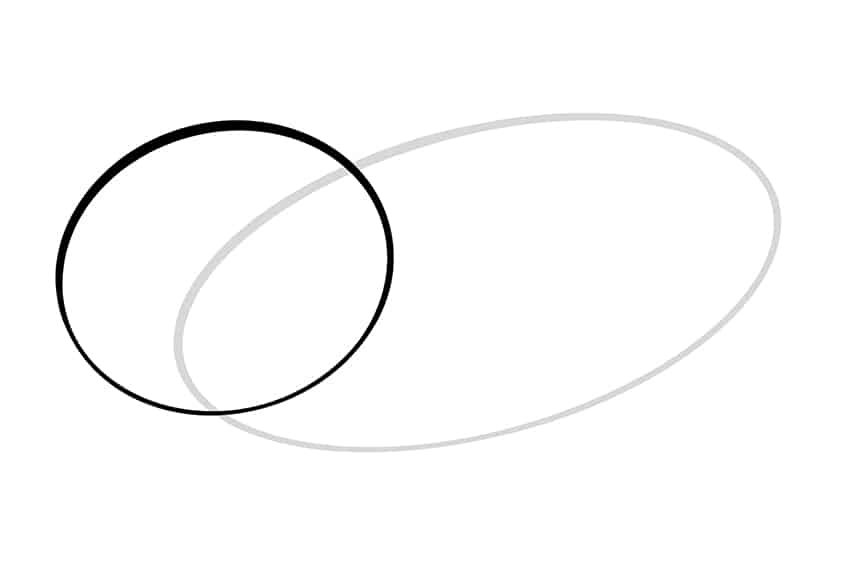
Step 3: Draw the Head of Your Deer Illustration
Above the main body and positioned to the right, draw a small oval shape. This will represent the head of the deer.
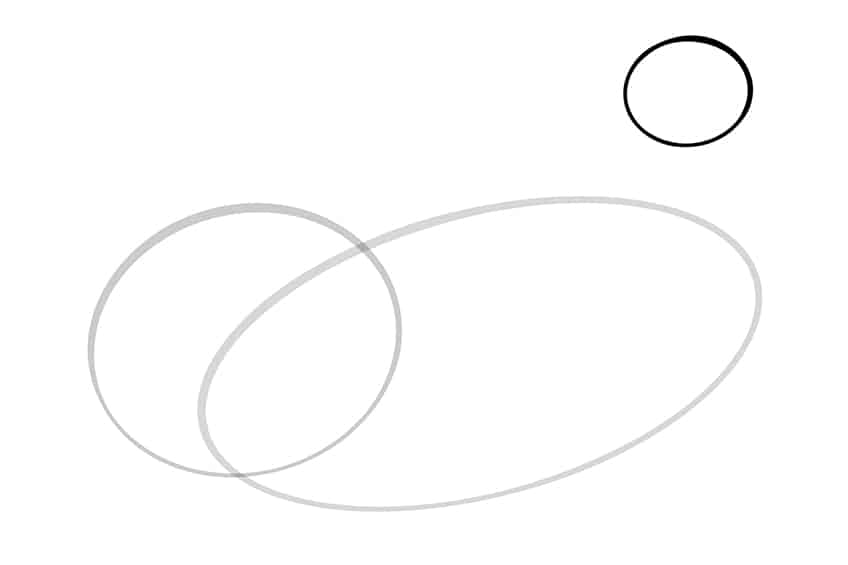
Step 4: Draw the Head Features
Attached to either side of the head, draw incomplete oval shapes that will represent the ears of your deer drawing. At the bottom of the head, in the center, draw a small circle to represent the mouth and nostril area.
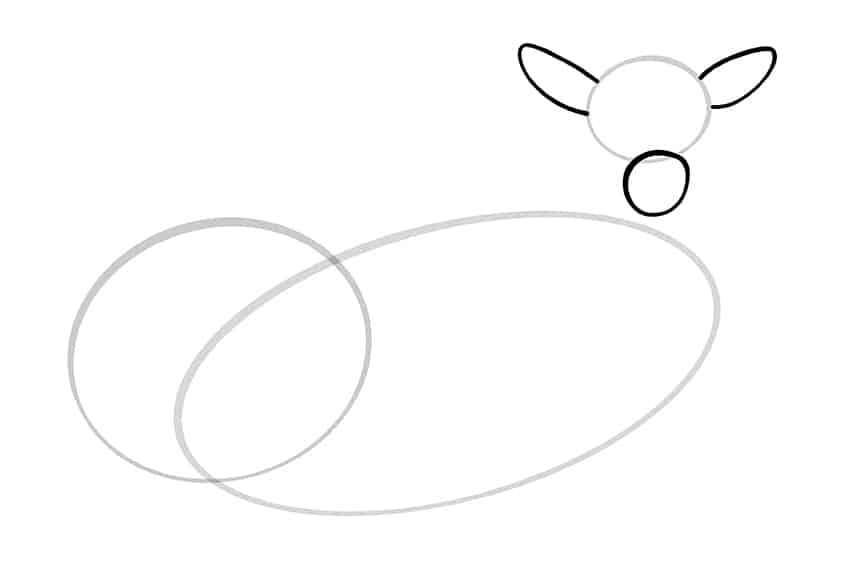
Step 5: Add the Neck to Your Deer Drawing Head
Draw an incomplete oval shape connecting the head to the main body.
Note! This oval shape should slightly overlap a portion of the main body.
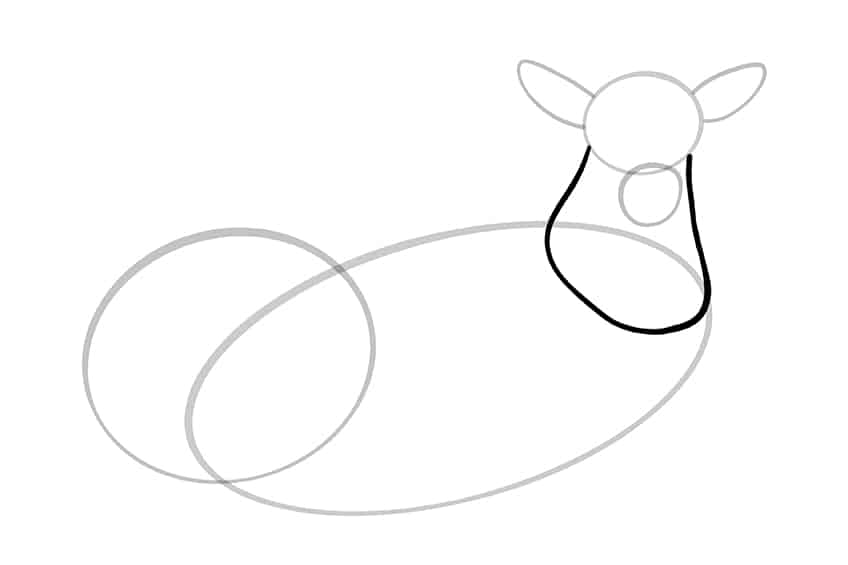
Step 6: Draw the Antlers
Attached to the top of the head, draw curved lines extending upward. These lines should be drawn close to the ears and should like somewhat branch-like.
You have just drawn a pair of antlers for your deer drawing!
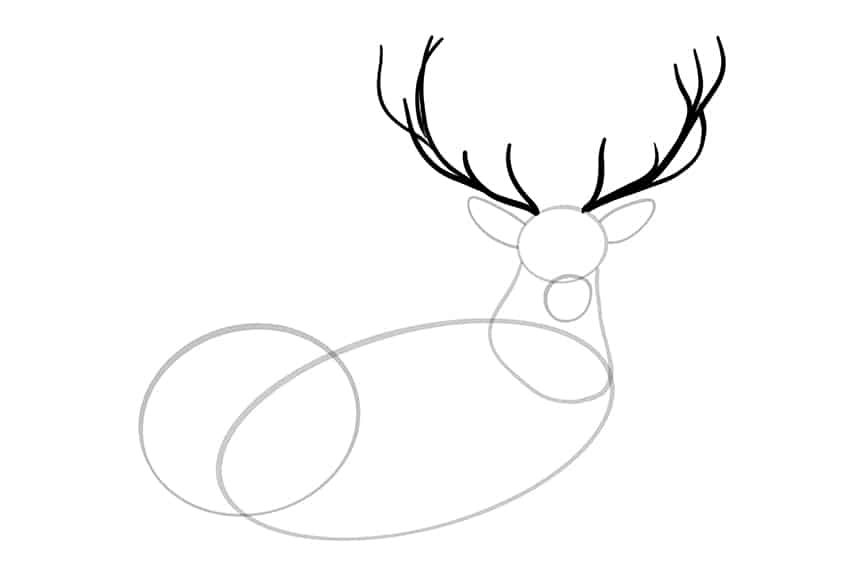
Step 7: Draw the Legs of Your Deer Illustration
To begin this step, start with the front legs of your deer. Draw four narrow lines and a small curved line just below the middle of each leg. This will represent the hoof on each leg.
Continue this step onto the back legs and add a thigh curve overlapping the rear body.
Complete your deer legs by drawing a hoof outline on each foot.
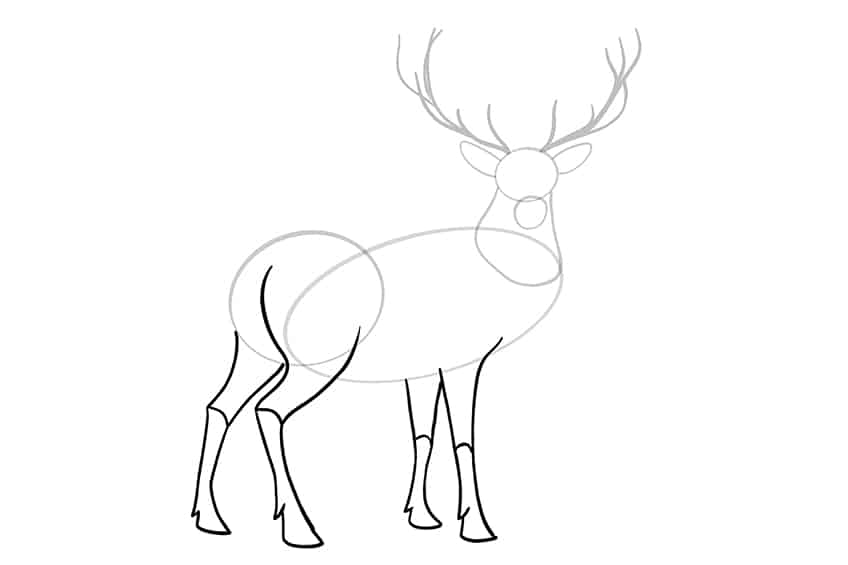
Step 8: Outline Your Deer Drawing
Begin to add a more realistic outline to your deer sketch with the aid of your construction lines. Start by outlining the antlers with solid lines surrounding the construction lines. Begin shaping the face and ears. Add details that include the eyes, nostrils, and mouth area.
Continue onto the entire body by adding a furry outline. Complete the outline by adding details to the hooves, and add a small furry path on the rear body to represent a tail.
Once you have completed this step, you can erase any visible construction lines.
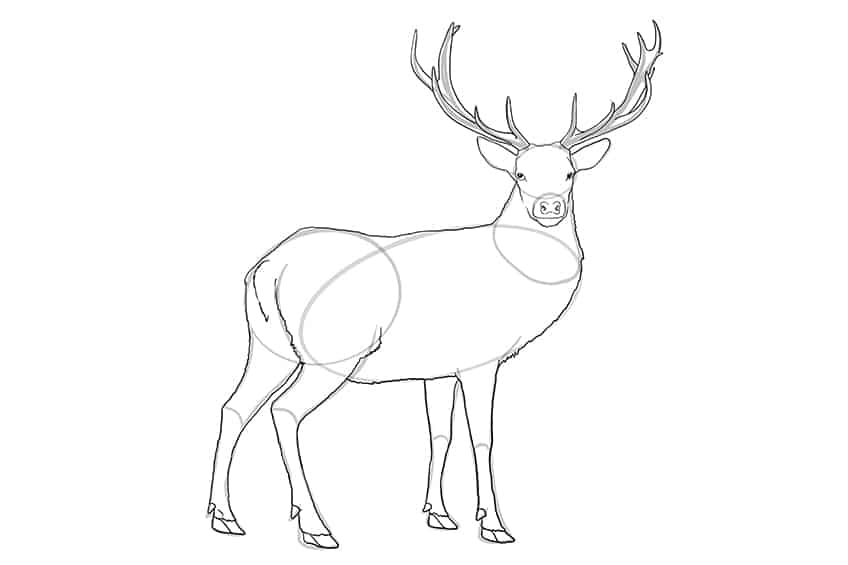
Step 9: Add Texture to Your Deer Art
In this step, we are adding a full coat of fur to your deer drawing. To do this correctly, start from the neck and draw wavy lines of medium and short lengths, all the way to the hooves of the deer. Repeat this step several times with slight spaces between each line.
Draw short lines within the antlers, ears, and head of your deer sketch. Finally, add rough texture lines surrounding the nostrils and mouth area.
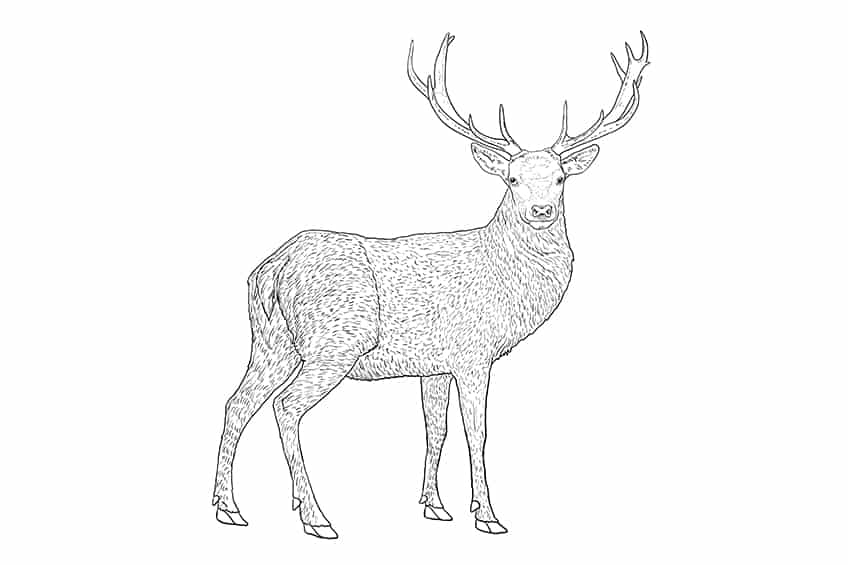
Step 10: Begin the Coloring Process
In this step, we are starting to add color to your deer drawing. Begin by selecting a normal paintbrush and brown paint, and paint the entire body of the deer. Using a small brush and gray paint, paint the hooves of your deer sketch.
Select a fine brush and dark cream paint, and evenly color in the antlers of our deer.
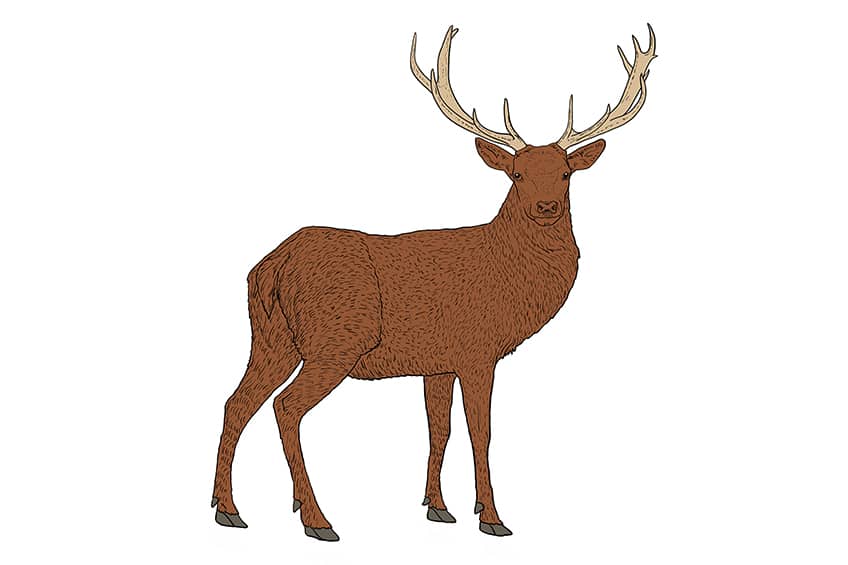
Step 11: Add a Secondary Color Coat and Begin Shading
The second coat of color acts as some of the highlights of the deer’s fur, so this step will be broken up into several parts.
Part one: Use a small, soft brush and black paint, and fill in one-half of each hoof.
Part two: Use the same brush but switch to white paint, and lightly paint around the eyes, the mouth, and the nostril area, and within each ear. Add a white shimmer to each eye using a fine, sharp brush.
Part three: With a soft brush and tan paint, apply light patches across the entire body of the deer, including the head and facial features.
Part four: Use the same brush but switch to dark brown paint, and apply a shadow to the underside of each antler.
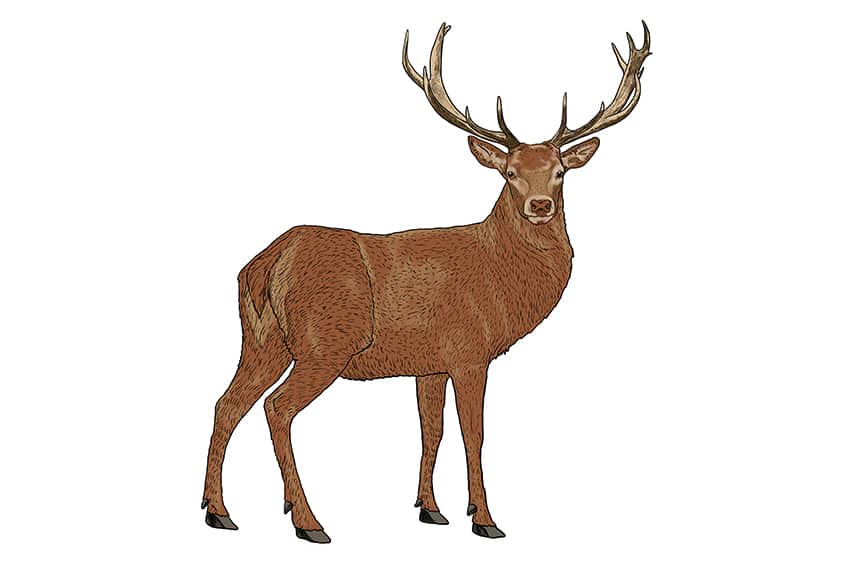
Step 12: Contour Your Realistic Deer Drawing
Make use of a soft brush and black paint, and gently add a contour around the edges of the deer.
This will create a more structured look to your deer art drawing.
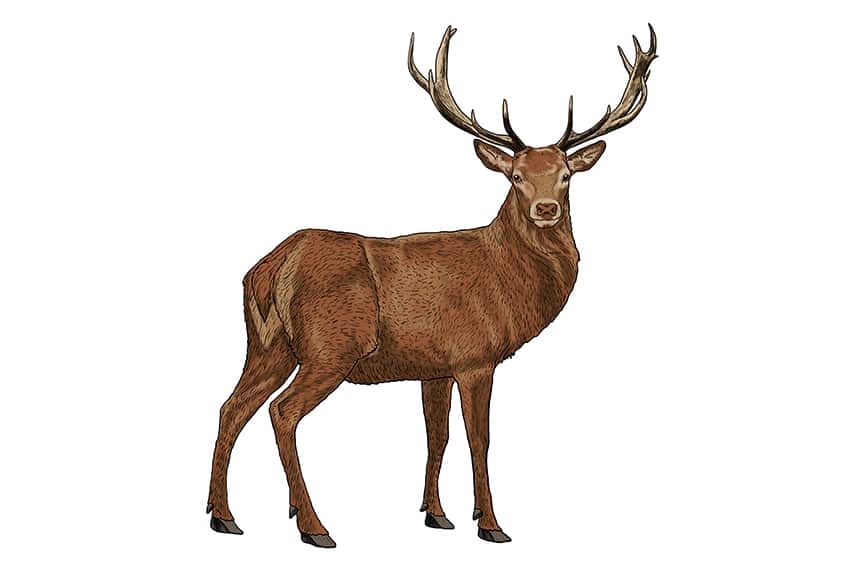
Step 13: Shade Your Deer Drawing Head and Face
Use the same brush and paint as previously, and enhance the contour areas on the face. Shade the facial features including the face structure, the eyes, ears, mouth, and nostril area.
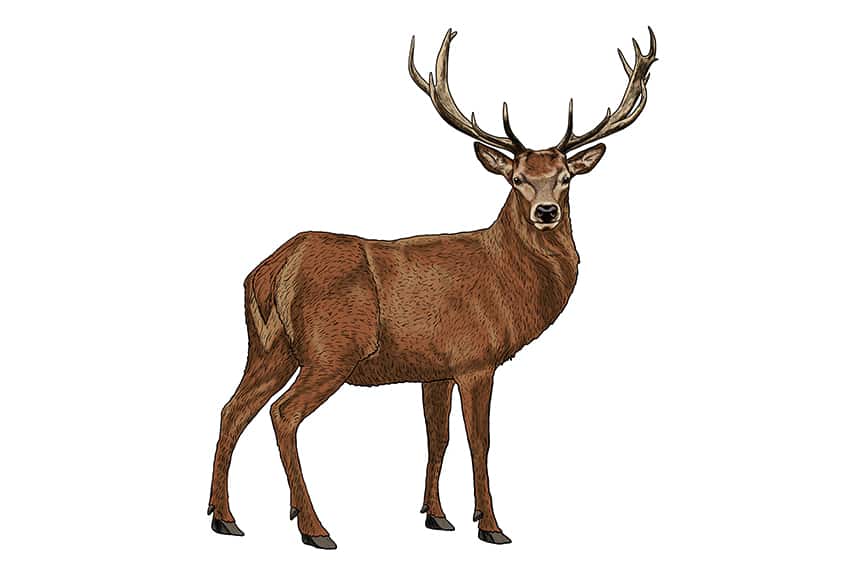
Step 14: Shade the Body of Your Deer Illustration
Repeat the same contouring process with the same materials as previously, except you will now focus on the deer’s body.
You are enhancing the structure of the deer and creating a more realistic deer drawing!

Step 15: Add Highlights to the Deer
Make use of a soft brush and white paint, and gently paint several highlighted patches along the side of the body and neckline.
Note! These highlights should be subtle and not too bright.
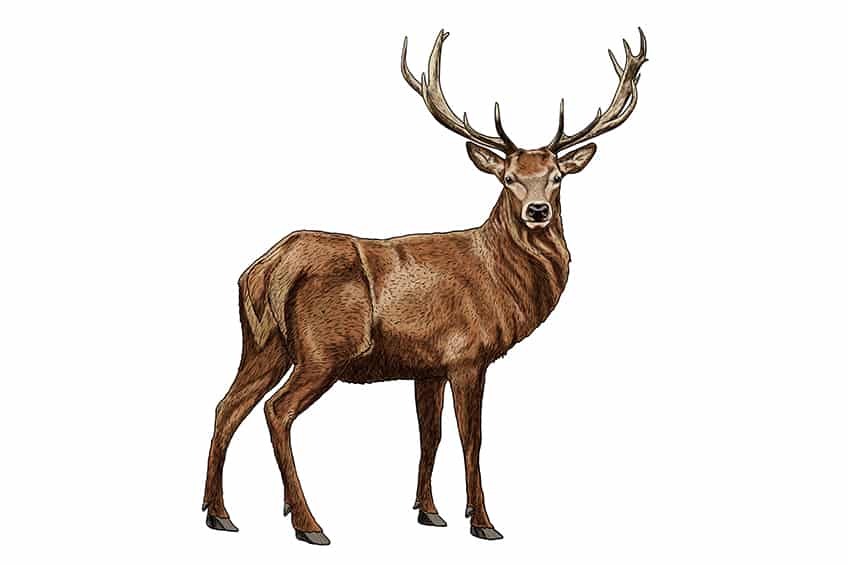
Step 16: Finalize Your How to Draw a Deer Sketch
You have reached the end of today’s drawing tutorial! To finalize your deer drawing and create a seamless look, use a fine, sharp brush and the corresponding colors, and trace the entire outline of your deer illustration.
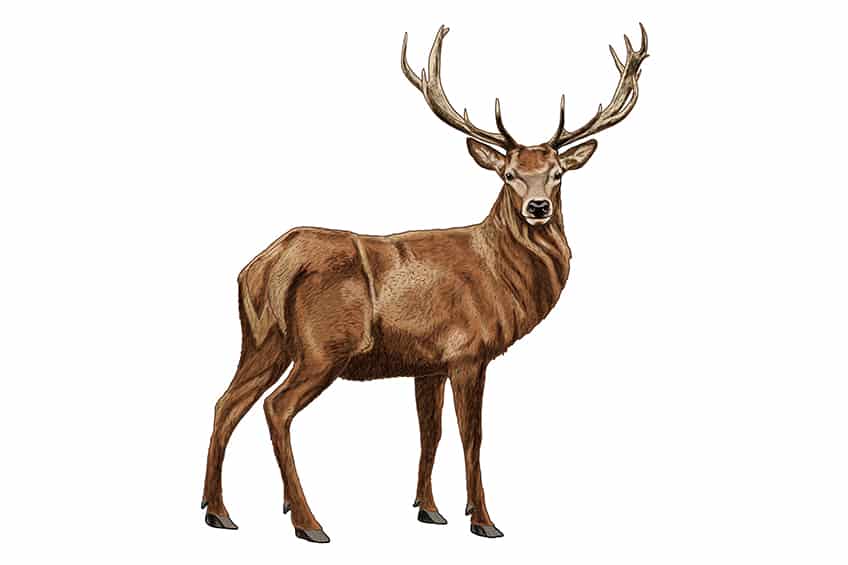
Step 17: Add a Shadow to Your Deer Drawing
To elevate your realistic deer drawing, you can also add a dark shadow directly underneath the deer!
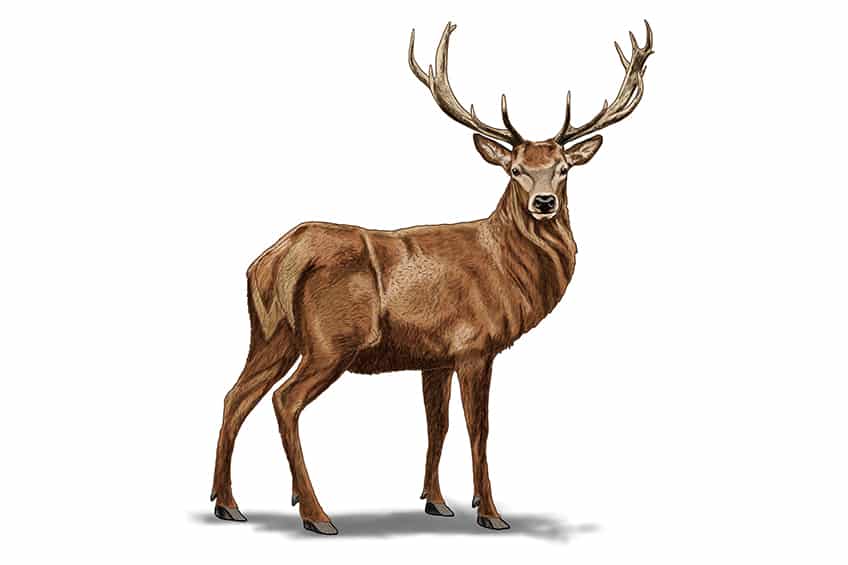
We have come to the end of our “how to draw a deer” drawing tutorial! After completing our easy step-by-step guide, you are left with a realistic and adorable deer drawing. We hope you have gained some valuable skills and can use these skills in your future drawings!
Frequently Asked Questions
How to Create a Realistic Deer Drawing Head?
To draw a deer head and make it look realistic, creating correct proportions is essential. What we mean by this is that the head of the deer cannot be bigger than the body, and the ears cannot be bigger than the head. Our how to draw a deer drawing tutorial will take you step-by-step through creating correct proportions, and in no time, you will have a realistic deer head!
What Colors Should a Deer Sketch Be?
In our drawing tutorial, we use the more traditional color of a deer, however, this does not limit you to creating your deer in any color you wish! Our drawing tutorials always try to encourage you to be as creative as possible!
Matthew Matthysen is an educated multidisciplinary artist and illustrator. He successfully completed his art degree at the University of Witwatersrand in South Africa, majoring in art history and contemporary drawing. The focus of his thesis was to explore the philosophical implications of the macro and micro-universe on the human experience. Matthew uses diverse media, such as written and hands-on components, to explore various approaches that are on the border between philosophy and science.
Matthew organized various exhibitions before and during his years as a student and is still passionate about doing so today. He currently works as a freelance artist and writer in various fields. He also has a permanent position at a renowned online gallery (ArtGazette) where he produces various works on commission. As a freelance artist, he creates several series and successfully sells them to galleries and collectors. He loves to use his work and skills in various fields of interest.
Matthew has been creating drawing and painting tutorials since the relaunch in 2020. Through his involvement with artincontext.org, he has been able to deepen his knowledge of various painting mediums. For example, watercolor techniques, calligraphy and lately digital drawing, which is becoming more and more popular.
Learn more about Matthew Matthysen and the Art in Context Team.
Cite this Article
Matthew, Matthysen, “How to Draw a Deer – Creating a Realistic Deer Drawing.” Art in Context. February 17, 2023. URL: https://artincontext.org/how-to-draw-a-deer/
Matthysen, M. (2023, 17 February). How to Draw a Deer – Creating a Realistic Deer Drawing. Art in Context. https://artincontext.org/how-to-draw-a-deer/
Matthysen, Matthew. “How to Draw a Deer – Creating a Realistic Deer Drawing.” Art in Context, February 17, 2023. https://artincontext.org/how-to-draw-a-deer/.


